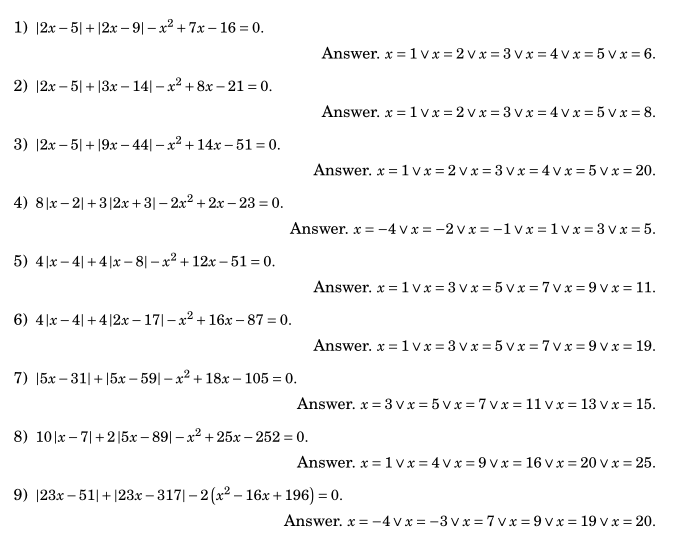Just use Solve instead of Reduce. We can eliminate $p$ by setting
f[x_] = Abs[a x + b] + Abs[c x + d] + m x^2 + n x;
and looking for $f(1)=f(2)=f(3)=f(4)=f(7)=f(9)=-p$ (which is necessarily integer when all parameters are integers).
As suggested by @Akku14, enlarging the search space yields solutions for $m\neq 0$:
Solve[Join[{Equal @@ f /@ {1, 2, 3, 4, 7, 9},
m != 0,
a >= 0, c >= 0, b <= d},
Thread[-100 <= {a, b, c, d, n} <= 100]],
{a, b, c, d, m, n}, Integers]
(* {{a -> 9, b -> -51, c -> 4, d -> -10, m -> -2, n -> 19}} *)
I've added the condition $b\le d$ to eliminate some duplicate solutions, i.e., solutions that differ only by interchanging $(a,b)$ with $(c,d)$. Further, I've added the conditions $a\ge0$ and $c\ge0$ to eliminate duplicate solutions that differ only in the sign of $(a,b)\leftrightarrow(-a,-b)$ or that of $(c,d)\leftrightarrow(-c,-d)$.
Further enlarging the search space gives more solutions:
Solve[Join[{Equal @@ f /@ {1, 2, 3, 4, 7, 9},
m != 0,
a >= 0, c >= 0, b <= d},
Thread[-1000 <= {a, b, c, d, n} <= 1000]],
{a, b, c, d, m, n}, Integers]
(* {{a -> 9, b -> -51, c -> 4, d -> -10, m -> -2, n -> 19},
{a -> 18, b -> -102, c -> 8, d -> -20, m -> -4, n -> 38},
{a -> 27, b -> -153, c -> 12, d -> -30, m -> -6, n -> 57},
{a -> 36, b -> -204, c -> 16, d -> -40, m -> -8, n -> 76},
{a -> 45, b -> -255, c -> 20, d -> -50, m -> -10, n -> 95},
{a -> 54, b -> -306, c -> 24, d -> -60, m -> -12, n -> 114},
{a -> 63, b -> -357, c -> 28, d -> -70, m -> -14, n -> 133},
{a -> 72, b -> -408, c -> 32, d -> -80, m -> -16, n -> 152},
{a -> 81, b -> -459, c -> 36, d -> -90, m -> -18, n -> 171},
{a -> 90, b -> -510, c -> 40, d -> -100, m -> -20, n -> 190},
{a -> 99, b -> -561, c -> 44, d -> -110, m -> -22, n -> 209},
{a -> 108, b -> -612, c -> 48, d -> -120, m -> -24, n -> 228},
{a -> 117, b -> -663, c -> 52, d -> -130, m -> -26, n -> 247},
{a -> 126, b -> -714, c -> 56, d -> -140, m -> -28, n -> 266},
{a -> 135, b -> -765, c -> 60, d -> -150, m -> -30, n -> 285},
{a -> 144, b -> -816, c -> 64, d -> -160, m -> -32, n -> 304},
{a -> 153, b -> -867, c -> 68, d -> -170, m -> -34, n -> 323},
{a -> 162, b -> -918, c -> 72, d -> -180, m -> -36, n -> 342},
{a -> 171, b -> -969, c -> 76, d -> -190, m -> -38, n -> 361}} *)
which are all just integer multiples of the first solution.


{a -> -2, b -> 2, c -> 0, d -> 1, m -> 0, n -> -2, p -> 1}with FindInstance. $\endgroup$m !=0? $\endgroup$